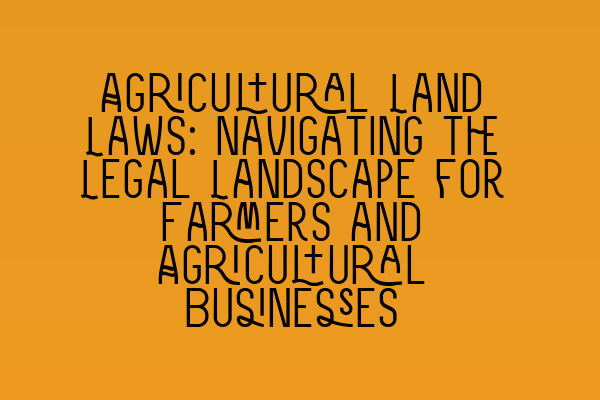As an agricultural solicitor at SQE Property Law & Land Law, I understand the challenges that farmers and agricultural businesses face when it comes to navigating the legal landscape surrounding agricultural land. The laws and regulations surrounding agricultural land can be complex and overwhelming, but with the right knowledge and guidance, farmers and agricultural businesses can ensure compliance and protect their interests.
In this blog post, I will explore the key aspects of agricultural land laws and provide insights on how farmers and agricultural businesses can effectively navigate these legal complexities.
1. Understanding Agricultural Tenancies:
One of the most important aspects of agricultural land laws is understanding agricultural tenancies. Agricultural tenancies are agreements between landowners and farmers, granting farmers the right to use the land for agricultural purposes. These tenancies are governed by specific legislation such as the Agricultural Holdings Act 1986 and the Agricultural Tenancies Act 1995. It is crucial for farmers and agricultural businesses to be well-informed about the provisions within these acts, as they outline the rights and responsibilities of both parties involved in the tenancy.
2. Types of Agricultural Tenancies:
There are different types of agricultural tenancies, each with its own legal implications. The two main types of tenancies are Agricultural Holdings Act (AHA) tenancies and Farm Business Tenancies (FBT). AHA tenancies are more traditional and offer greater security of tenure to the tenant, while FBTs provide more flexible arrangements for both the landlord and tenant. It is essential to understand the nuances between these tenancy types and determine which best suits your needs as a farmer or agricultural business.
3. Rent and Compensation:
Rent is a crucial aspect of agricultural tenancies, and the determination of rent can be complex. Rent reviews often occur at regular intervals, and they can be based on various factors such as the productivity of the land, market value, and any improvements made by the tenant. Additionally, understanding compensation for improvements is important, as tenants may be entitled to compensation for certain improvements made to the land.
4. Planning and Development:
Agricultural land often holds potential for development, especially in areas experiencing urbanization or industrial expansion. However, it is important to navigate planning and development laws carefully. Farmers and agricultural businesses should understand the local planning policies and regulations to assess the potential for diversification or development of their land. This includes obtaining planning permission for projects such as renewable energy installations, agricultural buildings, or diversification enterprises.
5. Environmental Stewardship:
The protection of the environment is a significant concern in today’s agricultural sector. Farmers and agricultural businesses must comply with environmental stewardship schemes and regulations, such as the Basic Payment Scheme (BPS) and the Environment Agency’s regulations. These schemes and regulations aim to promote sustainable farming practices, ensure biodiversity conservation, and prevent pollution. Understanding and complying with these regulations is essential to avoid penalties and maintain eligibility for agricultural subsidies.
6. Succession Planning:
Planning for the future is crucial, especially when it comes to passing on agricultural land and businesses to the next generation. Agricultural succession planning involves putting in place legal arrangements to ensure a smooth transition of ownership and management. This may include creating wills, trusts, or partnership agreements to address issues such as inheritance tax, capital gains tax, and the continuity of the business. Seeking professional advice from an agricultural solicitor is crucial to navigate succession planning effectively.
In conclusion, understanding and navigating the legal landscape surrounding agricultural land is essential for farmers and agricultural businesses. By familiarizing themselves with agricultural tenancies, rent and compensation, planning and development, environmental stewardship, and succession planning, farmers and agricultural businesses can protect their interests and ensure compliance with the law.
If you would like further assistance or guidance on agricultural land laws, please don’t hesitate to contact SQE Property Law & Land Law, where our team of experienced agricultural solicitors can provide expert advice tailored to your specific needs.
Related Articles:
– SQE 1 Practice Exam Questions
– SQE 1 Practice Mocks FLK1 FLK2
– SQE 2 Preparation Courses
– SQE 1 Preparation Courses
– SRA SQE Exam Dates
